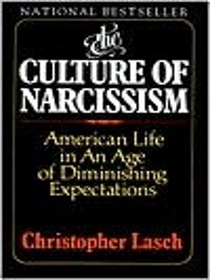Barbara R. (Crop4Fun) reviewed The culture of narcissism : American life in an age of diminishing expectations on + 1217 more book reviews
From Amazon: Review
"Much could be written about the signs of new life in the United States. This book, however, describes a way of life that is dying - the culture of competitive individualism, which in its decadence has carried the logic of individualism to the extreme of a war of all against all, the pursuit of happiness to the dead end of a narcissistic preoccupation with the self." Lasch's vigorous appraisal of contemporary American life is to be admired as much for the perspicacity of his observations as for the constancy of his argument and the scope of his supporting references. Expanding on ideas first introduced in the New York Review of Books, he deplores the loss of the sense of historical continuity, regrets the emergence of narcissism to a position of prominence, and points out its ubiquitous manifestations in public attitudes, politics, sports, education, childrearing practices, social policies - virtually all areas of public life. The ideologies of popular commentators (Gail Sheehy, Alex Comfort) are dissected, their chinks revealed; the shortcomings of the consciousness movement, the cults of intimacy and authenticity, are examined; some long-held sanctities are challenged. For example, Lasch suggests that the democratization of education "has contributed to the decline of critical thought and the erosion of intellectual standards, forcing us to consider the possibility that mass education, as conservatives have argued all along, is intrinsically incompatible with the maintenance of educational quality." More broadly recognized beliefs also fit into Ms thesis: "Advertising serves not so much to advertise products as to promote consumption as a way of life." And in tracing the "degradation" of sport - the disregard of conventions, athletes as entertainers and businessmen, the extinction of a sense of play in leisure activities generally - he moves assuredly from Huizinga to Howard Cosell. Lasch's carefully nuanced contentions will find both partisans and angry critics. He sees the merits of implications of the women's movement, the radical lesbians' distortions of its thrust, and the contemptibility of those who exploit it - "You've come a long way, baby" disguises access as autonomy. Other American social critics have commented on the trivialization of emotions, the confessional mode as conversation and literary development, the devaluation of the past and the hollowness of new prescriptions, but few write with Lasch's penetration, intelligence, and historical expertise. (Kirkus Reviews)
"Much could be written about the signs of new life in the United States. This book, however, describes a way of life that is dying - the culture of competitive individualism, which in its decadence has carried the logic of individualism to the extreme of a war of all against all, the pursuit of happiness to the dead end of a narcissistic preoccupation with the self." Lasch's vigorous appraisal of contemporary American life is to be admired as much for the perspicacity of his observations as for the constancy of his argument and the scope of his supporting references. Expanding on ideas first introduced in the New York Review of Books, he deplores the loss of the sense of historical continuity, regrets the emergence of narcissism to a position of prominence, and points out its ubiquitous manifestations in public attitudes, politics, sports, education, childrearing practices, social policies - virtually all areas of public life. The ideologies of popular commentators (Gail Sheehy, Alex Comfort) are dissected, their chinks revealed; the shortcomings of the consciousness movement, the cults of intimacy and authenticity, are examined; some long-held sanctities are challenged. For example, Lasch suggests that the democratization of education "has contributed to the decline of critical thought and the erosion of intellectual standards, forcing us to consider the possibility that mass education, as conservatives have argued all along, is intrinsically incompatible with the maintenance of educational quality." More broadly recognized beliefs also fit into Ms thesis: "Advertising serves not so much to advertise products as to promote consumption as a way of life." And in tracing the "degradation" of sport - the disregard of conventions, athletes as entertainers and businessmen, the extinction of a sense of play in leisure activities generally - he moves assuredly from Huizinga to Howard Cosell. Lasch's carefully nuanced contentions will find both partisans and angry critics. He sees the merits of implications of the women's movement, the radical lesbians' distortions of its thrust, and the contemptibility of those who exploit it - "You've come a long way, baby" disguises access as autonomy. Other American social critics have commented on the trivialization of emotions, the confessional mode as conversation and literary development, the devaluation of the past and the hollowness of new prescriptions, but few write with Lasch's penetration, intelligence, and historical expertise. (Kirkus Reviews)




